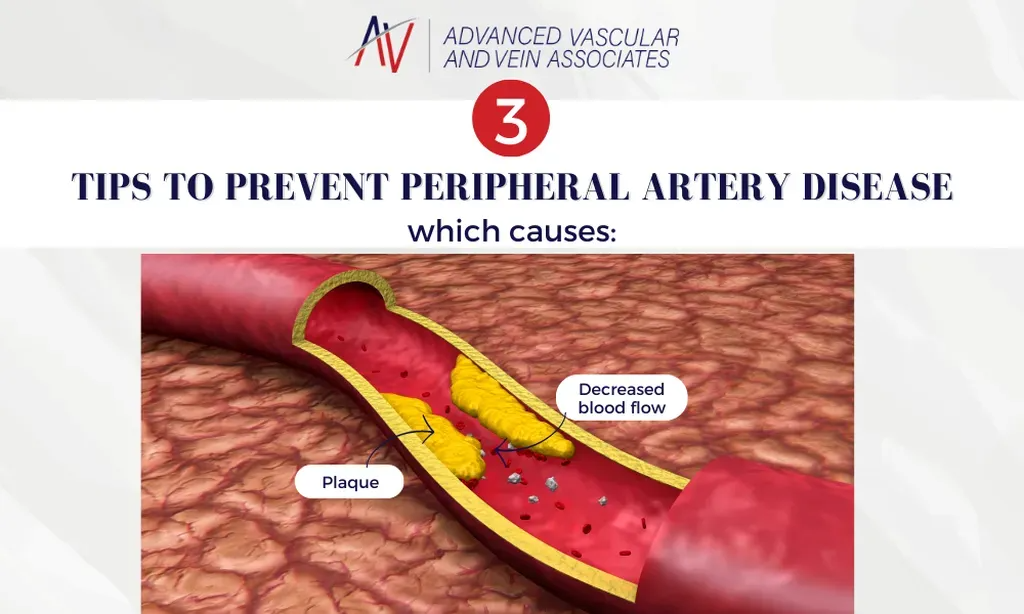Preventing Peripheral Artery Disease

Peripheral artery disease (PAD) is a common condition that affects blood flow in the legs and feet. It can lead to pain, cramping, and reduced mobility. Although there's no cure for PAD, some steps you take now can help reduce your risk of developing...
Peripheral artery disease (PAD) is a common condition that affects blood flow in the legs and feet. It can lead to pain, cramping, and reduced mobility. Although there's no cure for PAD, some steps you take now can help reduce your risk of developing it in the future. Here's what you need to know about preventing peripheral artery disease:
Don't smoke.
The most important thing you can do to prevent peripheral artery disease is to stop smoking. Smoking is the leading cause of peripheral artery disease, and it can lead to heart attacks and strokes as well as damage to your arteries. Smoking causes blood clots (also known as thrombosis) that block blood flow through your body's arteries, which can lead to pain in your legs when walking or exercising. These clots also increase your risk for developing atherosclerosis--a condition where plaque builds up inside an artery wall--and eventually narrowing it so much that no blood can get through at all. If this happens in an artery near one of your feet, it will cause severe pain when walking; if it happens higher up on one leg or both legs, you may need surgery to restore normal circulation before being able to walk again without pain.
Be more physically active, especially if you're overweight or obese.
Physical activity can help you control your blood sugar and blood pressure. It can also help keep weight in check and make it easier to sleep better at night. If this sounds like a lot of work, think about the benefits: being more active will make it easier for your heart to do its job by pumping blood throughout your body with less effort. The result? Less stress on the arteries that supply oxygenated blood (the ones that are not blocked).
Get your blood pressure under control.
Blood pressure is a significant risk factor for heart disease and stroke. If you have high blood pressure, it means that your heart must work harder than it should to pump blood through your arteries. This can cause damage over time as well as increase the likelihood of developing peripheral artery disease (PAD).
Eat a healthy diet with lots of fruits and vegetables.
A diet that includes plenty of fruits, vegetables, whole grains, and beans can help you lower your risk for peripheral artery disease (PAD). If you don't like to eat certain foods or have trouble preparing them because of arthritis or other health problems, talk to your doctor about ways to get more nutrients into your daily meals.
Manage diabetes well.
Diabetes is one of the most common risk factors for peripheral artery disease. If you have diabetes, it's important to manage your blood sugar levels well. The American Diabetes Association recommends that people with diabetes keep their A1C test results below 7 percent--the higher your A1C level, the greater your risk of developing complications such as peripheral artery disease.
If you have type 2 diabetes mellitus, make sure you're taking medications as prescribed by your doctor and following a diet recommended by him or her; if possible, work with a registered dietician who specializes in type 2 diabetes management to create an eating plan that works for you specifically.
Conclusion
Peripheral artery disease is a serious condition that can lead to heart attack and stroke. If you have risk factors for peripheral artery disease, making some simple changes in your lifestyle can help prevent it.
About Advanced Vascular & Vein Associates
Advanced Vascular & Vein Associates in Flowood, Mississippi, is the first outpatient-based laboratory in Central Mississippi. The practice, led by vascular surgeons Dr. Danón Garrido and Dr. Rishi Roy, is proud to provide life-changing, cutting-edge vascular care to a population and region that has not had easy access in the past. Services at Advanced Vascular & Vein Associates include highly effective minimally invasive treatments for peripheral artery disease (PAD), chronic venous insufficiency (CVI), varicose veins, carotid artery disease, arterial occlusion, and deep vein thrombosis (DVT or blood clot). Their diagnostic services are also available onsite for convenience.
